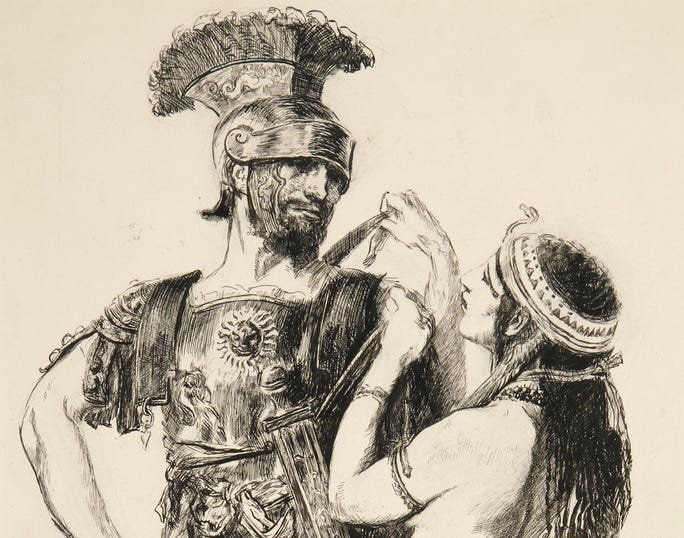Some readers might know that my day job mostly involves teaching Shakespeare. Some of my students tease me because my leisure time often involves reading Shakespeare.
What can I say? If it be a sin to covet beauty, I am the most offending soul alive.
Recently I’ve been reading Antony And Cleopatra, which is often (wrongly) excluded from the list of Shakespeare’s “great tragedies” (Hamlet, Macbeth, Othello, King Lear). I don’t know why it doesn’t make the cut. It might have something to do with the part of Cleopatra. It’s a very demanding role: Shakespeare’s Cleopatra is mercurial, petty, cruel, blithe, rash, vain, tempestuous, and pretty much everything else. Enobarbus, the cynical commentator in the play, can’t resist admiring her “infinite variety.”
I can only think of a few women in Hollywood who could handle the character. Cate Blanchett, maybe? Rosamund Pike? My ideal actress for the part would be Katharine Hepburn, who did actually play Cleopatra on stage in 1960. (The film version with the mesmerising Elizabeth Taylor and the mini-skirted Richard Burton is visually impressive but very un-Shakespearean.)

The play is based on an opposition: Rome represents law, restraint, and civic duty; Egypt represents excess, inebriation, and lust – a never-ending stag do. (This is a simplification of history, but a simplification found in Roman sources.) Antony’s desire for Cleopatra “o’erflows the measure” and she characterises an Egypt where everything is amplified: “We cannot call her winds and waters sighs and tears,” Enobarbus remarks, “they are greater storms and tempests than almanacs can report.”
Antony is torn between Rome and Egypt. One of the attractions of Alexandria is language and the voluptuous, voracious, vociferous Cleopatra. She and Antony speak mellifluous, grandiloquent sentences in a lofty style synonymous with Shakespeare. It puts some people off. Part of the reason for it is to highlight that the characters are heroic, even legendary. Cleopatra is the Queen of Egypt and is associated with the goddess Isis; Antony is one of the three joint-leaders of the Roman Republic and a descendant of Hercules. They don’t talk like ordinary people because they’re not ordinary.
In fact, they’re history. Apart from himself, Antony’s main rival is Octavius, one of his co-leaders and the future emperor Augustus. Near the middle of the play, Octavius calls Antony back to Rome to help him fight against some notorious pirates. An impetuous Cleopatra begs Antony not to go, but he eventually leaves after affirming his love for her. In Rome, the joint leaders of the Roman Republic meet:
OCTAVIUS: Welcome to Rome.
ANTONY: Thank you.
OCTAVIUS: Sit.
ANTONY: Sit, sir.
OCTAVIUS: Nay then.
Part of Shakespeare’s genius is that he can express so much with so little: this meeting has the subtlety that Jane Austen is famous for. Damning Antony’s revels with Cleopatra, Octavius, as the host, invites him to sit down. Antony refuses to accept the subordinate position and urges Octavius to accept his offer to sit. In this small quibble about seating arrangements, we learn that one leader of the Republic is trying to dominate the other.
Even though he is younger, Octavius is the one who is more measured. (Antony insults him by calling him “boy.”) Octavius’ speeches and actions don’t have the grandeur of Antony. The “boy” Octavius is the cold, calculating strategist.
Heroic, Antony is an artefact. With an outdated idea of honour and self-assertion, he challenges Octavius to single combat. Octavius doesn’t refuse the challenge; he ignores it – but he’s the one who ends up victorious at the end of the play. He has the last word.
Unlike Antony, Octavius is the complete statesman because he excels in peace and war; he is the one who inaugurates pax Romana, the Roman peace. Octavius is successful, but it would be hard to say that Shakespeare celebrates him; after all, it’s not his name on the posters.
Antony and Cleopatra are excessive, short-sighted, and vain – but their rhetorical curlicues attest to their vitality, their brio, their largesse. Octavius is the sensible ruler, but his plain speeches show us that we lose something when the age of heroes gives way to one of politicians.




Please more pieces on Shakespeare
I really need to reread Shakespeare